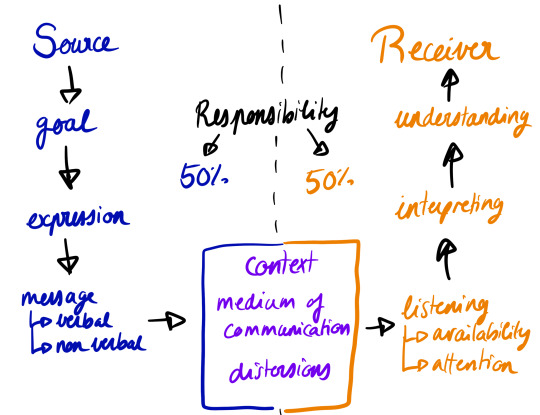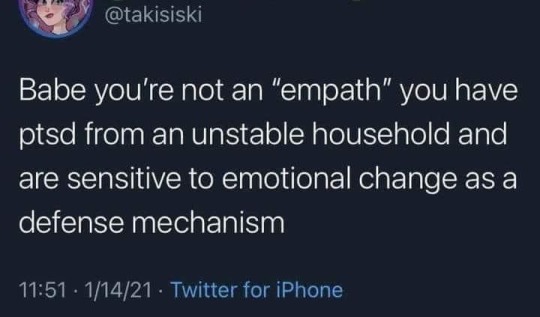#assertive communication
Explore tagged Tumblr posts
Note
Any idea to know what to do and say in terms of conflict?
Depersonalize others' comments & actions
Perceive the person's intentions – are they seeking war or peace?
If their intentions are sound, enter the conversation with the mindset of two individuals vs. a problem – decouple their humanity, emotions, wants, and needs from external factors & situations
Seek to understand, not win through your conversation
Approach the conversation from a solutions-oriented POV
Remember that compromise means both parties walk away happy or at least content with the outcome – self-sacrifice has no place in conflict resolution or negotiation
Hope this helps xx
#conflict resolution#interpersonal skills#interpersonal communication#interpersonal relationships#people skills#work culture#relationship tips#friend advice#interpersonal effectiveness#self confidence#communication skills#femmefatalevibe#q/a#social skills#assertive communication#self improvement
135 notes
·
View notes
Text
trying this new thing supposedly called being assertive. it went like "hey mom, just so you know, i want to come out to my aunt by the end of the week. do you want me to include you in the process or do you want me to do it myself?"
and she actually just went "oh, you can do it yourself no problem" instead of starting to meltdown and scream and try everything in her power to stop me.
i have to admit i felt pretty damn powerful lmao + if everything goes well i might be coming out to said aunt tomorrow!
12 notes
·
View notes
Text
@rosekoite asked me to say more about assertive communication due to this post. This is very simplified but here we go.
⚠️ LONG POST! ⚠️
INTRODUCTION
Assertiveness is the ability to express yourself truthfully and honestly while respecting yourself and others, in a way that's adequate contextually and based on your personal goals. The purpose of assertive communication is to be authentic and honest with ourselves and others. Period. Its point is NOT to obtain things from others and it's NOT a "better" or more efficient way of communicating in that sense.
In fact, very importantly, sometimes assertive communication IS NOT the best choice. For example, there are work situations during which you won't choose to be assertive and honest with your boss if you want to keep your job. There's a time and place for assertive communication and it's a choice you have to make depending on what's important to you at that time (eg keeping your job or being authentic?).
So why choose assertive communication when you can? When used adequately, it helps you clarify your needs, thoughts, and opinions. It makes you feel more in line with yourself. It teaches you to listen to yourself, and to express yourself and your needs. It helps with self confidence, self esteem, and trust in others. It can also help during conflicts. It makes you feel more in control of your life and better overall. I'd say it also helps with mentalizing, which is the ability to understand your and other people's mental states.
TYPES OF COMMUNICATION
Communication between two people works like this :

The responsibility is shared 50/50 between the two people. As the source, you're responsible for expressing all the relevant information clearly, honestly, and in a way that's coherent verbally and non verbally. As the receiver, you're responsible for being available and attentive. However, the message also goes through the context of your relationship, as well as a communication channel (aka it's not the same thing to talk face to face, on the phone, or by text), and this can lead to misunderstandings and distorsions.
According to this model there are different types of communications that we may all use at different times :
Inhibited behavior leads you to not express how you feel or what you think because you feel like you're less entitled to do so than others, you're scared you're going to be judged, or you put others needs and opinions before your own.
Aggressive behavior leads you to force how you feel and think upon others, and not leave any space for them to express themselves. You do not listen to what they have to say, and do not take what they feel and think into account.
Manipulative behavior can be lying, or just not being completely truthful about how you feel or what you think, but also irony, sarcasm, any type of communication that's indirect (making light of things that aren't, making someone else express your opinion for you, exaggerating, etc.)
Now the goal of assertive behavior is to minimize the distorsions and respect the 50/50 division of the responsibility in the communication by expressing truthfully and directly how you feel and what you think, without justifying yourself, in a way that's coherent on the verbal and non verbal level.
Again it doesn't mean it will "work" in the end in the sense of producing your desired outcome. However it will work in 1) respecting yourself by expressing yourself instead of silencing yourself 2) respecting the other party by not overpowering them 3) being honest, truthful, and authentic.
WHAT DOES IT MEAN IN PRACTICE?
Assertiveness requires 3 things :
Attitude : being sincere, honest with yourself and others, but also open to hearing their side of things and accepting that it might be different to yours
Involvement : talking about yourself, your emotions, and your thoughts as long as they're not disrespectful to the other party. Do NOT generalise. This is about YOU.
Precision : stay focused on a specific, clear aspect of things. If you're talking about something else, focus on behaviors and not character. Try to stay on the factual side of things rather than get into opinions.
EXAMPLES :
COMPLIMENT SOMEONE
(eg you like someone's content)
Don't : your blog is cool! (you're not involved, you're not precise!)
Do : I love the edits you post on your blog, I find them really beautiful.
RECEIVE A COMPLIMENT
(eg someone likes your edits)
Don't : aw thanks! or nah it's nothing! (you're maybe not honest, you're not involved, you're not precise!)
Do : I really appreciate your kind words it makes me very happy OR if you honestly disagree with the compliment which is ok as well thank you, I'm not too happy with this edit myself
EXPRESS A NEED, ASK FOR SOMETHING
(eg you're getting disrespectful anons)
Don't : not say anything or answer them kindly anyway or answer them unkindly (it's not precise, it's not honest, it's not involved)
Do : I would like it if you were more polite next time, I don't like being talked to that way
(remember : sometimes being assertive is not the best choice, you don’t need to engage every hateful anon, this is an example)
SAY NO, NEGOTIATE
(eg your anon is demanding you write the next chapter of your fic)
Don't : sorry I will get to it as soon as I can or fuck off anon or the problem is I'm having so much work and I broke my favorite mug and... (you're not honest! you're not precise! you're justifying yourself!)
Do : No. You can elaborate depending on how you feel IF YOU WANT but be careful not to start justifying yourself : I feel pressured when you keep asking or I'm worried you're going to be disappointed with me, but I can't/don't want to right now.
EXPRESS CRITICISM, DISAGREE
(eg anon is hateful again)
Don't : fuck you or you're an idiot (you're getting overwhelmed by your emotions, you're generalizing, you're not precise, you're not involved)
Do : I understand that you are frustrated but it hurts me when you do this / I don’t appreciate the way you’re talking to me (and I will not accept it)
RECEIVE CRITICISM
When receiving criticism, we will initially assume the person is justified and not wishing us harm.
Don't : you're just being a hater fuck you or omg they're right I suck as a person (you're getting overwhelmed by your emotions, you're not precise, you're not listening)
Do : clarify if necessary I don't understand what I did wrong can you explain it to me? then either agree and commit to doing better I admit that I was too aggressive in my answer and I will be more mindful from now or don't agree and ask for clarification I was not aggressive towards you so can you clarify what it is that made you angry?
BUT! Maybe the person is unjustified and does wish us harm! If so, there's several possibilities
You want to keep the relationship : clarify (if necessary or if they’re attacking your character instead of criticizing specific behaviors) + concede more or less vaguely + ask the person to do better in return = I'm sorry I don't understand what I did wrong can you explain it to me? [...] Okay I hear you, there's stuff I'm doing that you don't like. I want to say it's not clear to me what you're unhappy with and it makes me confused, I would like it if you were more precise so I can do better next time.
You want to keep the relationship but the person is taking it too far : refuse the confrontation = I refuse to talk to you when you're talking to me that way / I want to talk this through with you but I'm not feeling heard right now so I'll come back later + physically LEAVE
You don't care about the relationship : stay vague + stop the conversation + leave = It's your opinion, I'm not interested in talking about this further + LEAVE
These are all very simplified examples and it may seem a bit artificial at first but it gets easier with practice. Remember to 1) talk about yourself 2) be honest 3) be precise.
On the other hand, you also need to handle the other 50% of the communication aka receiving. Listen and be attentive. Accept that they might not agree with you, might think differently, might not be able to give you what you want. We're not trying to convince anyone here, we're just trying to be honest with ourselves and others.
Finally I want to remind everyone that as with all psychological tools, it is a TOOL and some people will use it in wrong ways. First of all, using these as a way to obtain things from people is NOT assertive communication, it's manipulation. Second of all, it doesn't mean that this tool is not useful when used properly!
8 notes
·
View notes
Text
i always want to kill some suitor(s)
2 notes
·
View notes
Text

Mars in the 3rd house influences communication, courage, and mental agility. Individuals with this placement are bold, assertive, and quick thinkers, excelling in debates and intellectual pursuits. However, challenges include aggressive communication, impulsive decisions, and sibling rivalry. With self-awareness, this energy can foster dynamic growth and learning
Visit now : Mars in 3rd House: Communication, Courage, and Challenges
#Mars#Mars in 3rd house#Communication skills#Assertive communication#Sibling relationships#Quick thinking#Courage and determination#Intellectual pursuits#Learning and knowledge#Short travels#Mars aggression#astrology
2 notes
·
View notes
Text
I am no longer accepting the things I can not change. I am changing the things I can not accept. -Angela Davis
#conflict resolution#effective communication#assertive communication#communication skills#difficult communication#emotional intelligence#healthy communication#womens empowerment#femaleempowerment#communication strategies#healthy boundaries
2 notes
·
View notes
Text
Why Assertive Communication is Key to Personal and Professional Success

Picture this: You’re at work, and a colleague takes credit for your idea during a team meeting. Your initial instinct may be to either stay silent (passive) or confront them aggressively. In both cases, the outcome is likely to be unfavourable. Now imagine addressing the issue assertively. You calmly but firmly state, “I appreciate the team’s enthusiasm for the idea, but I’d like to clarify that it originated from me. I’d love to collaborate further.” This approach not only ensures your voice is heard but also maintains professionalism and builds respect. Assertive communication strikes the perfect balance between standing up for yourself and respecting others.
Different Types of Communication
1. Aggressive Communication
An aggressive communicator often dominates conversations, interrupts others, and disregards opposing viewpoints. This behaviour can lead to conflicts, resentment, and strained relationships. While their goal may be to win or control, it often alienates others.
2. Passive Communication
Passive communicators avoid conflict at all costs. They may struggle to express their feelings or needs, often saying “It’s fine” even when it isn’t. Over time, this can lead to frustration, low self-esteem, and a sense of being undervalued.
3. Passive-Aggressive Communication
Passive-aggressive individuals appear outwardly agreeable but express their displeasure indirectly, often through sarcasm, backhanded compliments, or procrastination. This behaviour can confuse others and erode trust.
4. Assertive Communication
Assertive communicators express their thoughts and feelings honestly while respecting the needs and perspectives of others. They use clear language, maintain steady eye contact, and listen actively. This communication style fosters mutual understanding and builds stronger relationships.
Why Assertiveness is Beneficial:
Assertive communication helps resolve conflicts constructively, ensures everyone’s voice is heard, and promotes a positive, respectful environment.
Practical Tips to Be Assertive
1. Follow the 5 W’s (What, Why, When, Where, Who): Use these questions to structure your communication. For instance, “What do I want to convey?” or “Why is it important to express this?” This method ensures clarity and focus.
2. Apply the 5 R’s (Respect, Responsibility, Relevance, Reasoning, Resolution): Respect others’ views, take responsibility for your words, ensure relevance to the topic, explain your reasoning, and aim for resolution rather than conflict.
3. Pause Before Responding: Take a moment to collect your thoughts before speaking. This prevents reactive responses and allows you to articulate your points better.
4. Practice the “DESC” Method: Describe the situation, Express your feelings, Specify what you want, and state the Consequences. For example, “When you interrupt me during meetings (Describe), I feel disrespected (Express). I’d appreciate it if you let me finish my point (Specify). This will help maintain a respectful discussion (Consequences).”
5. Set Clear Boundaries: Assertively communicate limits. For instance, “I’m happy to help with this project, but I’ll need advance notice in the future.” This avoids overcommitment and ensures mutual respect.
If you lean towards being aggressive, focus on empathising and using softer language. If you’re passive, work on clearly stating your needs. Passive-aggressive individuals can benefit from replacing indirect cues with open dialogue.
Ways to Handle Non-Assertive Communicators
1. Dealing with Aggressive Communicators: Stay calm and avoid escalating the situation. Use assertive responses like, “I’d appreciate it if we could discuss this without interruptions.”
2. Handling Passive Communicators: Encourage them to share their thoughts. Ask open-ended questions like, “What’s your perspective on this?” to make them feel valued.
3. Managing Passive-Aggressive Behaviour: Address it directly but tactfully. For example, “I sense there might be an issue. Can we talk about it?”
4. Interacting with Assertive Communicators: Be open and honest. Their approach is often collaborative, making it easier to resolve issues.
Conclusion
Assertive communication is a cornerstone of success in both professional and personal spheres. It fosters mutual respect, builds stronger relationships, and ensures that your needs are met without compromising others. Most importantly, it boosts self-worth and personal growth. By embracing assertiveness, you not only navigate conflicts effectively but also create an environment of understanding and collaboration. Start today, and watch how it transforms your interactions!
To know more about Assertive Communication https://protocol.org.in/why-assertive-communication-is-key-to-personal-and-professional-success/
#effective communication#business communication#professional development#communication skills#active listening#assertive communication
0 notes
Text
How to Set Boundaries & Stop People Pleasing
Learn to set boundaries, stop people pleasing, and have healthier relationships with others and yourself 💞 Today, we’re diving into the important topic of boundaries—how to set healthier ones, foster better relationships, stop acting out of guilt or obligation, and break free from people-pleasing habits. If you find it hard to say “no,” then this is for you. Hi, loves! Welcome back. I’m excited…
#assertive communication#assertiveness#authenticity#boundaries#boundary setting techniques#building healthy habits#communication#conflict resolution#cultivating self-awareness#dealing with guilt#effective communication#emotional boundaries#emotional intelligence#emotional regulation#emotional resilience#emotional safety#emotional well-being#emotional wellness#empowerment#energy management#healthy habits#healthy relationship dynamics#healthy relationships#inner peace#intentional living#intentional relationships#interpersonal skills#life balance#life skills#maintaining balance
0 notes
Text
Why I’d Give Up the Word “Maybe” and What It Would Change
Daily writing promptIf you had to give up one word that you use regularly, what would it be?View all responses If I had to give up one word that I use regularly, it would be “maybe.” It’s a word that often finds its way into my conversations, both in personal and professional settings. I’ve noticed that it gives me a certain level of comfort, acting as a buffer when I’m unsure of something or…
#Assertive communication#Avoiding indecision#clear communication#confident decision making#convenient escape#dailyprompt#dailyprompt-2052#decisive language#Effective decision-making#giving up maybe#Improving communication skills#Intentional conversations#Non-committal language
0 notes
Text
If someone is making a weird expression and you're not sure how to interpret it, here's a good thing to try! "I'm not sure if you're aware, but I'm not sure if I'm understanding an expression correctly. It looks like when you [description of expression], you're [emotion]. Is that right?"
Most of the time people really and truly have no idea about the expressions they're making, or how they could be interpreted! Frequently, their explanation is something different from what one was expecting!
Another thing that's really helpful with assertive communication is to believe what people tell you, and to take their words at face value.

32K notes
·
View notes
Text
Setting Boundaries to Avoid Stress in Your Life
In our fast-paced and demanding world, the concept of setting boundaries can sometimes feel daunting. Yet, establishing clear limits is essential for maintaining mental and emotional well-being. Boundaries help us define our personal space, time, and energy, ensuring that we don’t become overwhelmed by the demands of others or the expectations we place on ourselves. Understanding the importance…
#Assertive Communication#Balanced Life#Boundaries Are Healthy#Boundary Setting#Communication Skills#Emotional Health#Emotional Wellness#Healthy Boundaries#Healthy Relationships#Know Your Limits#Manage Your Time#Mental Health Awareness#mental health matters#mental health support#Mental Health Tips#mental strength#mindful living#Personal Growth#Personal Space#Productivity Hacks#Productivity Tips#Professional Boundaries#Respect Your Limits#self care tips#Setting Boundaries#Stress Free Living#stress management#Stress Relief Tips#Time For Yourself#Time Management
0 notes
Text
The ever-changing nature of life can be a source of stress and anxiety. Whether it’s facing new health challenges, navigating family dynamics, or adapting to career transitions, change can be disruptive.
0 notes
Text
Navigating peer pressure can be a challenging aspect of adolescence, impacting one’s mental well-being and potential for substance abuse. Behavioral health in Phoenix, Arizona is a priority, understanding how to manage peer influence is crucial for fostering a healthy community.
0 notes
Text
Bullying... & Standing Up for Yourself
Confrontation, conflict, comparison, and judgment are inevitable parts of human interaction. These elements can become particularly harmful when they manifest as bullying. Understanding how to navigate these situations, especially when you find yourself the target of bullying, is crucial for maintaining your mental and emotional well-being. Confrontation & Conflict Confrontation and conflict…

View On WordPress
#Anti-bullying strategies#Assertive communication#bully#Bullying#Bullying awareness#Conflict Resolution#Confronting bullies#education#Emotional Well-being#Empowerment#Mental Health#mental-health#Overcoming bullying#Personal safety#Resilience#Self-confidence#Self-protection#Setting Boundaries#social-media#Standing up for yourself#Support systems
0 notes
Text

Mars in the 3rd house influences communication, courage, and mental agility. Individuals with this placement are bold, assertive, and quick thinkers, excelling in debates and intellectual pursuits. However, challenges include aggressive communication, impulsive decisions, and sibling rivalry. With self-awareness, this energy can foster dynamic growth and learning.
Visit now : Mars in 3rd House: Communication, Courage, and Challenges
#Mars#Mars in 3rd house#Communication skills#Assertive communication#Sibling relationships#Quick thinking#Courage and determination#Intellectual pursuits#Learning and knowledge#Short travels#Mars aggression#astrology
0 notes
Text

Now available on Amazon and Audible: https://www.amazon.com/STATE-P-L-Y-S-DIFFICULT-CONVERSATIONS-ebook/dp/B0BXXV1WQR/
#effective communication#emotional intelligence#conflict resolution#assertive communication#healthy boundaries#healthy communication#co-dependency#female empowerment#difficult communication#communication skills#communication strategies
0 notes